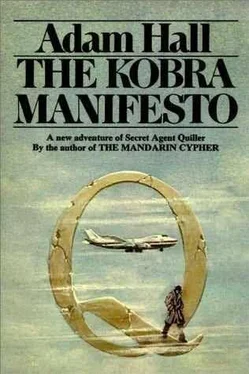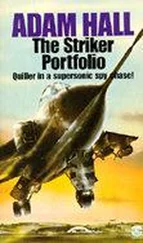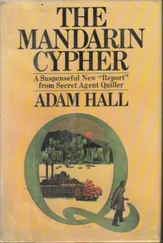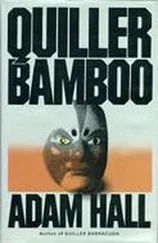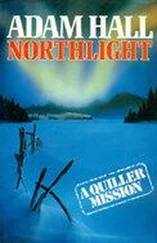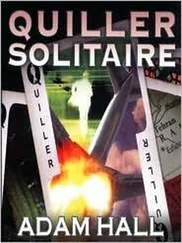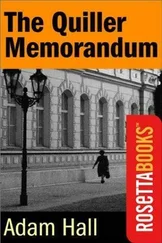'For days, yes. Or weeks. Of course there's a breakoff point'
I didn't look at Burdick.
He was watching me.
That doctor hasn't indicated my daughter is in any immediate danger?'
'No. But if she's to remain in there much longer we'd have to set up what would amount to field medical facilities and in my opinion they wouldn't allow that.'
'There's no way,' the FBI man asked heavily, 'you can go back in there and drive those people out under our guns? I have fifty marksmen deployed.'
The Defence Secretary turned away slightly and I had the feeling they'd discussed this idea and couldn't agree on it.
'There'd be no point,' I said. They'd bring the girl with them and even if you picked off the six of them simultaneously without touching her, one of them at least would live long enough to shoot her at close range.'
Burdick was moving away from the group and Ferris gave me a signal and I followed both of them across the tarmac until we were out of earshot. The briefcase under the Defence Secretary's arm was a security model with four straps and a centre lock and provision for a wrist chain. This was the form I'd assumed the exchange material would take and that was why I'd talked to Kuznetski.
Burdick stopped,
'Are you willing to go back into the airplane, Mr Wexford?'
'Yes, sir.'
He held out the briefcase.
'This is the material they asked for.'
It was difficult to tell him.
'They've got a man there with a degree in atomic physics.'
His tired eyes went dead.
'Kuznetski?' Ferris asked.
'Yes.'
None of us spoke for a while.
From here I could see some of the marksmen ranged along the roof of the main building. Others were deployed in unmarked cars at regular intervals, their dark barrels poking towards the Boeing: these would fire last of all and only then if the situation became fluid and mobile. A dozen Air Force vehicles stood near the end of the main hangar and a group of uniformed officers were talking together, some of them with field glasses raised to watch the aircraft.
A Sheriff's Department helicopter stood just beyond the emergency bay with a pilot leaning against its door and an Air Force man talking to him, and I could see two DPS vehicles over by the tower, their lights still rotating.
There was very little noise. The sun was fitful behind high cloud patches and the ground wind sometimes whipped the lanyard of the flag against its pole, over the main building, making a ringing sound because the pole was metal.
Mentally I wasn't too occupied. I'd done all the thinking there was to be done and the situation hadn't changed because the Defence Secretary was carrying the material I'd expected him to be carrying: Zade had come here for nuclear arms and they were in this briefcase in the form of blueprints and equations. It was known that the PLO had the technical capability of producing medium-yield weapons and all they needed were the designs and that was what Zade had asked for and wasn't going to get: because Burdick couldn't let him have them.
They should have known that.
All Burdick had been able to do was to bring his daughter back on the soil of her homeland and close to him, and then hope for a miracle.
I didn't have one for him.
Nobody had.
'I was in signals,' Ferris told me, 'with London.' They'd taken their bloody time, I thought, finding out about Kuznetski. Not that it mattered; a man like Zade would know his operation depended on the expert evaluation of the material for exchange, and if he hadn't brought Kuznetski he'd have brought someone else.
'So what does London say?'
Ferris looked at his feet 'It's over to you.'
I was listening carefully. The final directive Ferris had given me from Manaus was to go out for the Kobra cell: the life of Patricia Burdick was an incidental factor. So the mission had ended here. Kobra had to be eliminated and that could now be done, as soon as someone gave the signal. It didn't have to be me. It would have, finally and perhaps after days of bitter and useless negotiation, to be James Burdick. He would be given the exclusive right, presumably, of condemning his daughter to death.
I glanced at him. For the moment he seemed to have forgotten us: he was just looking at the ground, his tired eyes narrowed, the wind moving a lock of his greying hair. I didn't think he had any constructive thoughts in his mind: he'd lived with this thing for days on end, and nights on end, and he must have considered every possible solution, and drawn blank.
I looked away from him to Ferris.
'London says I've got discretion?'
'Yes.'
'Total?'
'Yes.'
I turned back to Burdick.
This man Kuznetski,' I said, 'is probably quite good. How good are those designs?'
His head had 'come up and he hadn't immediately understood what was being said to him: he'd caught it about halfway.
'Oh.' He looked at the briefcase. 'Not good enough for an expert to read.' He raised his head to watch the Boeing. 'These people are terrorists, and terrorists aren't normally very intelligent. So I thought maybe they'd just-' he gave a slight shrug — 'accept this stuff without looking at it too hard. There wasn't anything else I could do, was there?'
'No,' I said.
'But we have to try. Don't we?.'
'Of course.'
He was looking at me steadily now. 'I'd like it right on the line, Mr Wexford. You've been in there with them and you know them better than we do. And you don't think there's a chance, do you?'
'No.'
He looked away.
The silence came in again.
A few ideas had occurred to me during the flight from Belem and I'd had enough time to treble-check them for feasibility and none of them had stood up, not one. The only thing left was a technical last-ditch action, with the odds so steep that I'd got it out of my mind.
But I thought about it now because there wasn't any choice.
'Ferris,' I said quietly, 'I want to talk.'
He looked up at me quickly.
'Mr Secretary,' he said, 'will you excuse us for a moment?'
'Of course.'
I walked with Ferris across the tarmac, halfway to the emergency bay. Burdick wouldn't like the proposal and I was going to leave Ferris to persuade him to give me a completely free hand.
'Look,' I said, 'if I'm going back in there I'll need something a bit more useful than that ersatz stuff in the briefcase. I want something I can argue with — something they can understand.'
He was looking towards the Boeing.
'What do you need?' he asked me.
'I need to break their nerve.'
Chapter Seventeen: ZERO-ZERO
I went aboard the Boeing at 14:55.
Zade was unarmed, waiting at the top of the flight steps.
Ventura and Ramirez were on each side of him with a submachine-gun trained on me as I came up.
Zade took the briefcase from me and went into the aircraft.
The other two lowered their weapons and I followed Zade aboard, telescoping the antenna of the walkie-talkie.
I saw Patricia Burdick at the rear of the main passenger compartment with Dr Costa, and went along the aisle to talk to them.
At this point I had the urge to turn back and get out of the Boeing and stay out, stay alive. But then I would have to live with myself afterwards.
'Your father sends his love,' I said to the girl. 'He wants you to know you'll be home again soon now.'
She stared up at me without saying anything for a moment, as if she were repeating what I'd said to herself a few times to find out if it were true, whether she could trust me.
'How's he taking this?' she asked.
'Very calmly. He knows you'll soon be home.'
Quietly she murmured, 'Sure,' and closed her eyes.
I wondered how much she'd be able to do for herself, if she had the chance; her skin was waxen and wet with perspiration. Dr Costa looked at me with his mournful eyes but said nothing; I thought that inside he was praying, and to the most powerful of his gods.
Читать дальше
